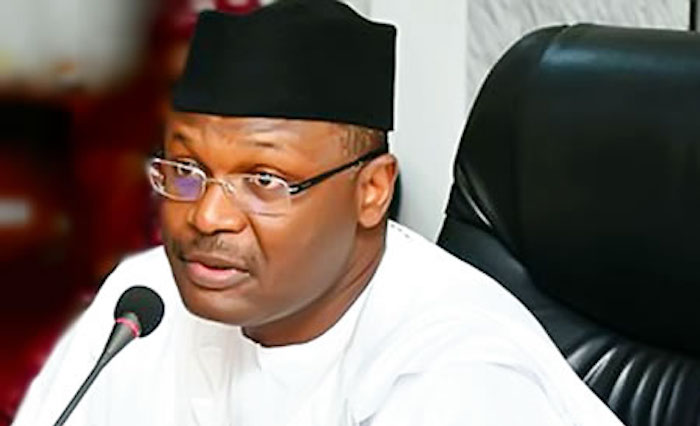The Independent National Electoral Commission (INEC) has vowed to take disciplinary action against its officials, including ad-hoc or collation personnel, who were found wanting in the conduct of the Presidential and National Assembly Elections on February 25.
INEC Chairman Prof. Yakubu Mahmood announced this information on Saturday in Abuja at a meeting with Resident Electoral Commissioners RECs.
“As the gubernatorial and state assembly elections approach, we must work harder to overcome the obstacles encountered in the past election. The Nigerians will accept nothing else, he declared.
“Any personnel found to have been negligent, whether they are regular or ad hoc officials, including Collation and Returning Officers, must be excluded from future elections. Where prima facie proof of wrongdoing has been proven, RECs must also quickly commence disciplinary action.
In addition, he informed the RECs that the logistics for Election Day must be finalized days before the election and handled by the Electoral Officers at the Local Government level.
This has been our customary procedure. As a result of centralizing the process, as was the case in certain states, the deployment of staff and materials was delayed, as was the start of voting.
“RECs will be held accountable for any late arrangements or failure to deploy electric power generators to required collation centres or polling locations. The Commission has adequate facilities in all of the Federation’s states. Just failing to deploy them is unforgivable,” he added.
Yakubu also noted that ad hoc workers who participated in the last election must receive refresher training, and if they are replaced for a valid reason, they must be adequately taught so that processes are not delayed or compromised at any stage.
According to him, the Commission has received reports from its State offices as well as complaints and petitions from political parties and candidates as a result of last week’s election.
According to him, when violations of any type are confirmed, there will be redress, and any action taken by the Commission is without prejudice to the rights of parties and candidates to seek additional recourse as permitted by law.
Regarding Election Day technology, Yakubu said that the Bimodal Voter Accreditation System (BVAS) will be utilized once again for voter accreditation and result administration.
As evidenced by the outcomes of recent elections, he stated that the deployment of BVAS has gone a long way towards sanitizing voter registration.
“Since last week, the Commission has accelerated its evaluation of the technology to ensure that issues, notably those involving the uploading of results, are resolved. We are convinced that the system will operate optimally in the future”, he stated.
Supplemental Surveys
Yakubu added that the commission would shortly hold supplemental elections in 46 Senatorial and Federal Constituencies, noting that just 98 of 109 Senate seats had been announced as of this point.
In the House of Representatives, eight political parties have won 325 of 360 seats, according to INEC.
He said that Senators-elect will receive their Certificates of Return on Tuesday and Representatives-elect would receive theirs on Wednesday.
Yakubu stated, “In the elections held last Saturday, winners were announced for 423 national legislative seats, while supplementary polls will be held in 46 constituencies. 98 of the 109 Senate seats have been declared. Seven political parties have won seats in the Senate, while eight political parties have won 325 of 360 members in the House of Representatives. In terms of party representation, this national assembly is the most diverse since 1999.
Yakubu stated in the Senate that the All Progressives Congress APC has 57 seats, followed by the APGA with 1, the Labour Party with 6, the NNPP with 2, the Peoples Democratic Party with 29 seats, and the Social Democratic Party with 2.
Regarding the House of Representatives, the African Democratic Congress (ADC) won 2 seats, the All Progressives Congress (APC) 162, the All Progressives Grand Alliance (APGA) 4, the Liberal Party (LP) 34, the New National Party (NNPP) 18, the People’s Democratic Party (PDP) 102, the Social Democratic Party (SDP) 2, and
“Certificates of Return will be presented to Senators-elect on Tuesday, March 7, 2023 at 11 a.m. at the National Collation Centre (the International Conference Centre) in Abuja, while Members-elect of the House of Representatives will receive theirs on Wednesday, March 8, 2023 at 11 a.m. at the same location.
“But, for proper crowd control, each Senator/Member-elect should bring no more than two visitors. The complete list of newly-elected members will soon be released to the Commission’s website, Yakubu added.
The Chairman of INEC acknowledged that the national elections held last week raised a lot of concerns that require immediate, intermediate, and long-term remedies.
According to him, while the planning for the election was meticulous, its execution entailed problems, some of which were unexpected.
“The challenges of logistics, election technology, the conduct of some election staff at various levels, and the attitude of some party agents and supporters all contributed to the extraordinarily difficult environment in which elections are typically held in Nigeria.
“We admire the sacrifice and tenacity of Nigerians, as well as the dignity and maturity exhibited by political leaders despite differing opinions regarding the election. Many lessons have been acquired. Immediate concern for the Commission is how the identified difficulties may be resolved as we approach the last phase of the General Election involving the biggest number of constituencies, including 28 State Governorship elections and 993 State Houses of Assembly seats, he said.
